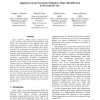Free Online Productivity Tools
i2Speak
i2Symbol
i2OCR
iTex2Img
iWeb2Print
iWeb2Shot
i2Type
iPdf2Split
iPdf2Merge
i2Bopomofo
i2Arabic
i2Style
i2Image
i2PDF
iLatex2Rtf
Sci2ools
144
click to vote
KBSE
1997
IEEE
1997
IEEE
Applying Concept Formation Methods to Object Identification in Procedural Code
Legacy software systems present a high level of entropy combined with imprecise documentation. This makes their maintenance more difficult, more time consuming, and costlier. In order to address these issues, many organizations have been migrating their legacy systems to new technologies. In this paper, we describe a computer-supported approach aimed at supporting the migration of procedural software systems to the objectoriented (OO) technology, which supposedly, fosters reusability, expandability, flexibility, encapsulation, information hiding, modularity, and maintainability. Our approach relies heavily on the automatic formation of concepts based on information extracted directly from code to identify objects. The approach tends, thus, to minimize the need for domain application experts. We also propose rules for the identification of OO methods from routines. A well-known and self-contained example is used to illustrate the approach. We have applied the approach on medium/large p...
KBSE 1997 | Legacy Software Systems | Procedural Software Systems | Software Engineering | Software Systems |
| Added | 06 Aug 2010 |
| Updated | 06 Aug 2010 |
| Type | Conference |
| Year | 1997 |
| Where | KBSE |
| Authors | Houari A. Sahraoui, Walcélio L. Melo, Hakim Lounis, F. Dumont |
Comments (0)

